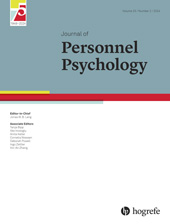Diskussionsforum
Intelligenz: allgemein oder domain-spezifisch?Kommentar zum Artikel ”Emotionale Intelligenz - ein irreführender und unnötiger Begriff\ von Heinz SchulerIntelligence: general or domain-specific?
Literatur
(1999). Assessing vocational preferences among gifted adolescents adds incremental validity to abilities: A discriminant analysis of educational outcomes over a 10-year intervall. Journal of Educational Psychology , 91 , 777– 786
(1990). Predictors of high academic achievement in mathematics and science by mathematically talented students: A longitudinal study. Journal of Educational Psychology , 81 , 430– 441
(1993). Human cognitive abilities. A survey of factoranalytic studies . New York, NY: Cambridge University Press
(1993). Constructs and models pertaining to exceptional human abilities. In K. A. Heller, F. J. Mönks & A. H. Passow (Eds.), International handboook of research and development of giftedness and talent (pp. 69-87). Oxford: Pergamon Press
(1989). Perspectives on the diagnosis of giftedness. The German Journal of Psychology , 13 , 140– 159
(2001). Giftedness, psychology of. In N. J. Smelser & P. B. Baltes (Eds.), International Encyclopedia of the Social & Behavioural Sciences, Vol. 9 6222– 6227 Amsterdam: Elsevier
(Hrsg.) (2002). Begabtenförderung im Gymnasium. Ergebnisse einer zehnjährigen Längsschnittstudie . Opladen: Leske + Budrich
(1994). The study of mathematically precocious youth: The first three decades of a planned 50-year study of intellectual talent. In R. F. Subotnik & K. D. Arnold (Eds.), Beyond Terman: Contemporary longitudinal studies of giftedness and talent 255– 281 Norwood, NJ: Ablex
(2001). Follow-up-Untersuchungen zur Münchner Hochbegabungsstudie. In K. A. Heller (Hrsg.), Hochbegabung im Kindes- und Jugendalter (2. Aufl. 357– 446 Göttingen: Hogrefe
(1994). The Munich longitudinal study of giftedness. In R. F. Subotnik & K. D. Arnold (Eds.), Beyond Terman: Contemporary longitudinal studies of giftedness and talent 77– 114 Norwood, NJ: Ablex
(2002). Emotionale Intelligenz - ein irreführender und unnötiger Begriff. Zeitschrift für Personalpsychologie , 1 , 138– 140
(2000). Giftedness as developing expertise. In K. A. Heller, F. J. Mönks, R. J. Sternberg & R. F. Subotnik (Eds.), International handbook of giftedness and talent (2nd ed. 55– 66 Amsterdam: Elsevier
(Eds.) (1986). Conceptions of giftedness . New York, NY: Cambridge University Press
(2000). Prediction of excellence in school, higher education and work. In K. A. Heller, F. J. Mönks, R. J. Sternberg & R. F. Subotnik (Eds.), International handbook of giftedness and talent (2nd ed. 317– 327 Amsterdam: Elsevier
(1950). The structure of human abilities . (2nd ed.). London: Methuen
(2000). Conceptions of giftedness from a metatheoretical perspective. In K. A. Heller, F. J. Mönks, R. J. Sternberg & R. F. Subotnik (Eds.), International handbook of giftedness and talent (2nd ed. 3– 21 Amsterdam: Elsevier



